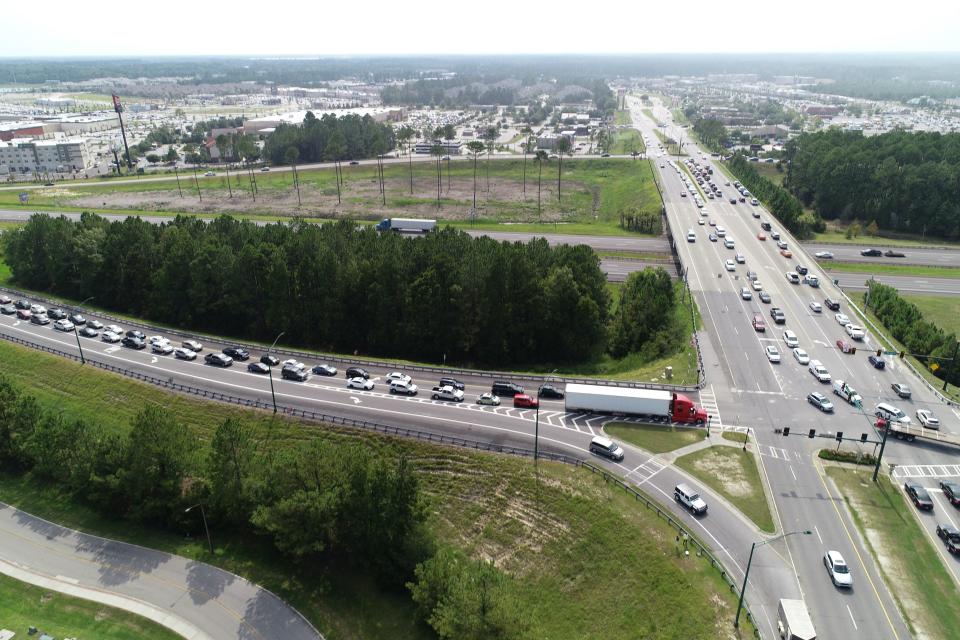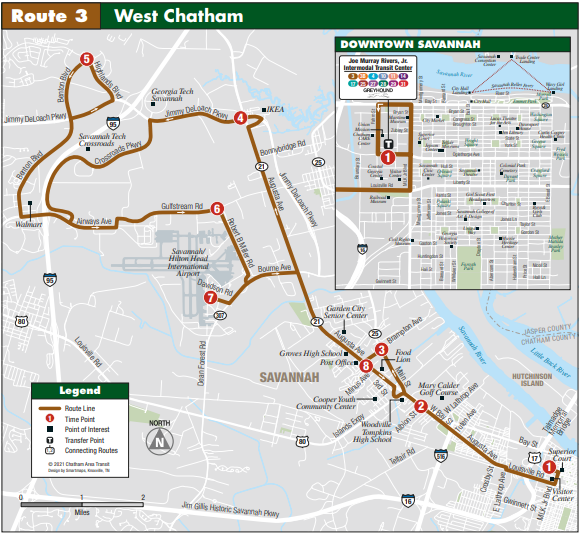Pooler residents reject funding public transit with taxpayer dollars, but 'the need is still there'
As one of the fastest growing areas in the county, Pooler’s need for a public transit system is growing dire. But, according to a recent ballot vote, officials will have to find a funding source other than increasing the property tax of its residents if they want public transportation in the city.
In May’s primary elections, a question was posed to the city of about 27,000 on the local ballot: would you support a property tax increase of 1.15 mills to help fund Chatham Area Transit (CAT) bus stops?
About 4,000 residents, less than 20% of eligible voters, cast a vote. 61% of them said no.
The ballot referendum, which was essentially a formal poll of Pooler’s residents, would not have led to any immediate action. The outcome doesn’t mean CAT will never expand to Pooler either. But it did give city officials an idea of what their citizens – albeit a small fraction – are thinking about how public transit should be funded in the city.
UPDATE: City of Pooler proposes first millage increase in 10 years to accommodate growth
With inflation at its highest rate in more than 40 years, suggesting a millage increase – an unpopular move even in normal times – was bound to meet opposition. But how much would a household actually have to pay?
For the average home price of $300,000, an increase would mean paying an additional $138 on the annual property tax bill. (Property tax is calculated by multiplying the millage with a home's assessed value (40% of the fair market price) and dividing the total by 1,000).
“Right now with the cost going up, we don’t need to add to it. Inflation is high, gas prices continue to rise and, not sure [if] you’ve been to a grocery store lately, but you don’t get much for $100 these days,” remarked one resident, Wes Hager.
Read more: In May, home sales reached an average of $280,000 in Chatham, Effingham and Bryan Counties
Alternatives to funding CAT could involve public-private partnerships or CAT voluntarily subsidizing the service, said council member Aaron Higgins.
However, a millage is how other cities and areas that are currently part of CAT’s fixed bus route fund the service. Residents in the city of Savannah, unincorporated Chatham County and a portion of Garden City pay the additional 1.15 mills so that CAT buses can operate in their area.
Take a look at CAT's other services, including paratransit:
Yet, efforts to get Chatham County’s seven other municipalities to fully join the public transit network have been futile so far. Discussions have roiled on for years, especially as the west side of the county continues to grow and bring new job opportunities. Residents need affordable and accessible methods of travel, yet fears about tax increases and traffic congestion continue to delay moves toward expansion.
Lack of advertising and education on referendum
Some Pooler city officials believed that the ballot referendum was not advertised effectively this election cycle, leading to the low voter turnout and majority opposition.
“I don’t think CAT or the county did a very good job marketing the advantages of CAT for Pooler,” said council member Tom Hutcherson, “I think if they did a better job, the vote would have been a little closer.”
Voter turnout is typically lower in primary elections. However, council member Higgins also believes some residents may have been confused and others, misinformed, about what they were voting.
“I saw this many times online where people said, ‘This means there’s going to be CAT stops on Pooler Parkway,’” said Higgins.
Pooler Parkway is the city’s main corridor and becomes heavily congested during peak traffic hours. Residents already fed up with the jams fear buses will only exacerbate the problem.
“If they (CAT) came to us, and said they want CAT stops on Pooler Parkway, we’d tell them to go back to the drawing board and find different places to stop,” explained Higgins.
More: TSPLOST referendum may be pushed to November ballot after county, city officials spar
Creating a fixed bus route would be a collaborative process. But if Pooler were to take city funding off the table, officials are worried that the city would wield less influence in the plans.
“If it’s being funded by taxpayer dollars, then the city of Pooler would have more of a say where the CAT stops are going to be in that intergovernmental agreement,” said Higgins.
Why do people oppose public transportation?
Convincing some residents to take a financial hit for public transport is difficult. Opposition from Pooler residents has typically stemmed from potential tax increases and traffic concerns.
“I think Pooler residents understand the huge growth and the people's need for access, but increasing local taxes and endangering safety are not an option most are willing to consider,” said Pooler resident Kat Scandura.

However, proponents of public transit argue that it can alleviate congestion.
“We can expand the roads all we want, but we also need to look at alternative methods of transportation such as encouraging more biking … and mass transit such as CAT buses is also one of those potential solutions,” said Higgins.
Another prevailing thought amongst opponents of public transit is that it increases chances of crime. The theory that greater mobility would funnel more criminals and wrongdoers into suburbs outside of the city is not unique. But the belief is often unsubstantiated and, according to some studies, unfounded.
The author of a Bloomberg article that explores the correlation between transit and crime in Atlanta writes, “the transit-crime question has been studied directly in Atlanta at least twice—and in both cases, the results offer very little reason to fear a connection.”
In some areas where new public transit systems were built, crime actually decreased. Such was the case of North Carolina’s light rail transit and Vancouver’s SkyTrain rail system.
Still, public transit has faced an uphill battle over the last half century, according to the Urban Institute. Reliance on automobiles, suburban sprawl and lack of transit-centered land-use development have all fed off of each other and contributed to the lack of ridership and subsequent lack of support.
Some believe that not enough people will use the buses that taxpayers subsidize. In the Town of Thunderbolt’s case, that was true.
In 2019, Thunderbolt decided not to enter a contract with CAT precisely because an analysis found that an average of six residents per day were using the nine bus stops within the city. In the years prior, CAT had operated in Thunderbolt by mistake – an oversight when CAT took over the previous entity, Savannah Transit Authority, in 1987.
To continue the service, Thunderbolt would have had to enter into an intergovernmental agreement with CAT, which would require levying the additional property tax. It wasn’t worth it, city officials found.
However, Thunderbolt is a small community of no more than 3,000 people. City officials decided that the existing bus stop at nearby Savannah State University was sufficient to service the town.
Why vouch for public transit?
For larger and continuously growing cities in west Chatham County, not having public transit has more dire consequences. The one bus stop on the intersection of Benton and Highlands Boulevard is not enough to accommodate the entire city of Pooler, let alone the entirety of west Chatham, said Hutcherson.
“When you look at Benton Boulevard and the number of people that have to traverse from that stop to Tanger Outlets where they work, I think it’s a potential danger,” said Hutcherson.
The Benton and Highlands stop sits in a non-contiguous portion of Savannah and is the most western edge of the route. For people walking to Tanger Outlets, a major shopping center, for work or for leisure, it would take about an hour.

More: Plenty of good-paying warehousing, logistics jobs in Chatham County, but retention is key
More: Opportunity, jobs await workers at warehouses, ports in West Chatham. They have to get there first
Hutcherson pointed out that employers are allowed to contract with CAT if they wanted to establish a bus stop for their employees. According to a CAT spokesperson, Tanger Outlets has not engaged in serious talks recently about adding a bus stop.
Mobility gives people more access to better job opportunities and, thus, a better quality of life. Those are the overlooked and, oftentimes, hard to calculate benefits of public transit, pointed out Hutcherson.
“The need is there and it’s going to continue to be there,” said Hutcherson.
Guin Waite, who moved from the city of Savannah to Pooler, said the absence of a public transport system felt like a gaping hole. In the early 2000s, Waite said she was a struggling single mother and couldn’t afford a car. But living within Savannah city limits was a blessing.
“I was able to ride the bus to take my kids to doctor appointments, go grocery shopping and go to work,” said Waite. “The bus offered me a way of taking care of myself and my children, and not burden others by asking for rides.”
When Waite moved her family to Pooler, the contrast was stark. She had a car by then, but then it broke down. Most of her family’s social services were still located in Savannah.
“I had to walk to the local convenience store, otherwise I had to pay for food delivery,” said Waite, “We had to pay an Uber over $50 to get my son’s neurologist appointment in Savannah.”
Waite’s situation illustrates how a public transport system could vastly improve the lives of other lower-income residents and those who don’t have a driver's license or have a disability that doesn’t meet the eligible criteria for paratransit services.
Waite says her current vehicle is on the brink of conking out and she can’t afford the necessary repairs yet.
“If it breaks down tomorrow, we could be walking again,” she said, “A bus to get me across town would be my only hope.”
Nancy Guan is the general assignment reporter covering Chatham County municipalities. Reach her at nguan@gannett.com or on Twitter @nancyguann.
This article originally appeared on Savannah Morning News: West Chatham needs public transit, why did Pooler residents vote no?

